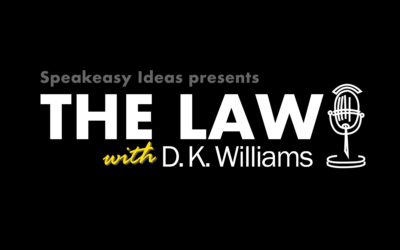Speakeasy Ideas Presents
THE LAW WITH D.K. WILLIAMSGiving the courts credit when they get it right. Holding them accountable when they don’t.
D.K. Williams is a rare bird. He’s a lawyer who understands economics, cherishes freedom, and loves ideas. That’s why he’s part of the Speakeasy Ideas crew!
In his weekly podcast, THE LAW, D.K. judges what the courts say about the law according to the standards of the U.S. Constitution as well as the timeless principles of individual freedom, private property, and natural justice.
THE LAW is part of the Speakeasy Podcast feed. Don’t miss an episode! Subscribe to Speakeasy Ideas podcasts on iTunes or your favorite podcast app. You can also find D.K. on Facebook and Twitter.
D.K. is available for teaching, consulting, inspiring, & public speaking. He’s quite good. Just send an email to th****@sp************.com and we’ll make it happen.
The Law episode 83: Presser v. Illinois
Podcast: Play in new window | Download
Subscribe: Apple Podcasts | RSS
In a U.S. Supreme Court opinion written between the passage of the 14th Amendment and when the Court started “incorporating” the Bill of Rights against the states, the Court upheld the conviction and $10 fine against Herman Presser. Presser had led a group of about 400 armed people calling themselves Lehr und Wehr Verein (The Teaching and Defense Association), a pro-labor socialist group, in a parade through Chicago. In what must have quite the spectacle, Presser led the parade on a horse and carried a cavalry sword. Such armed parades were against Illinois law. Sometimes this case is cited, erroneously, by gun control advocates. Find out why.
The Law episode 82: Jacobson v. Massachusetts
Podcast: Play in new window | Download
Subscribe: Apple Podcasts | RSS
What is the extent of government authority to “protect” the common good during a public health crisis? Earlier this year, the United States Supreme Court denied a California church’s request to stop the enforcement of certain public health rules that negatively affected the way the church conducted religious services. In doing so, the Court relied upon the 115 year old Jacobson case that upheld a mandatory smallpox vaccination. The language used by the Court in Jacobson is frightening: “The possession and enjoyment of all rights are subject to such reasonable conditions as may be deemed by the governing authority of the country essential to the safety, health, peace, good order, and morals of the community.” We discuss where that standard leads.
The Law episode 81: Bostock v. Clayton County
Podcast: Play in new window | Download
Subscribe: Apple Podcasts | RSS
Earlier this year, the Supreme Court of the United States — in a 6-3 decision in the case of Bostock v. Clayton County — held that homosexual and transgender people are protected from employment discrimination under the Civil Rights Act of 1964. The Act prohibits discrimination against anyone “because of sex.” Neil Gorsuch, writing for the majority, concluded that firing someone from a job due to their homosexuality or transgender status is prohibited by that language.
The Law episode 80: Chiafalo v. Washington
Podcast: Play in new window | Download
Subscribe: Apple Podcasts | RSS
In the conclusion to the rogue elector saga we have been following, the Supreme Court applied what I refer to as the “Erosion Doctrine” to unanimously hold that states can turn their presidential electors into mere rubber stamps, thus depriving them of any discretion when selecting the president. Over two centuries, the power of electors to use their discretion slowly eroded until this case, decided earlier this year, officially killing off that discretion and an original part of the Constitution with it.
The Law episode 79: Ramos v. Louisiana
Podcast: Play in new window | Download
Subscribe: Apple Podcasts | RSS
Earlier this year, SCOTUS overturned precedent by a 6-3 margin and held that states cannot convict someone of a criminal offense unless the jury verdict is unanimous. Evangelisto Ramos had been convicted by a 10-2 verdict and sentenced to life in prison without the possibility of parole in Louisiana. Ramos was granted a new trial by this decision.
The Law episode 78: RNC v. DNC
Podcast: Play in new window | Download
Subscribe: Apple Podcasts | RSS
Earlier this month, the U.S. Supreme Court, in a controversial 5-4 decision, overruled a lower court order expanding Wisconsin statutory deadlines for submitting mail-in ballots due to the state government’s response to the Coronavirus. The five justice majority were all appointed by Republican presidents. The four justice minority were all appointed by Democratic presidents. Was this a strictly partisan outcome?


